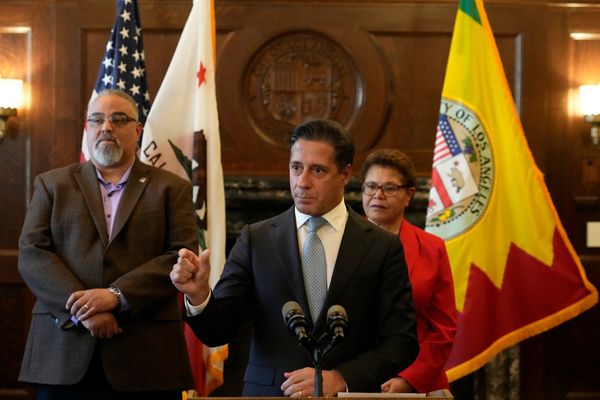In the final stage of the 2024 election campaign, the Conservatives have turned to scaremongering about the size of the Labour majority thought to be on the cards after July 4.
The idea seems to be that allowing one party to take the lion’s share of seats, however democratically, would be an undemocratic outcome – like writing that party a blank cheque to do whatever it likes.
Critiques on this front will have to be faced and addressed – with both humility and a clear plan. But the more likely challenge for Starmer will be internal party management to ensure that all voices are heard. If he can do this, having lots of MPs makes for healthy and rigorous debate.
It is clear the domestic and international context that an incoming Labour government would face in 2024 will be markedly different from that inherited by Labour in 1997.
Economist and political theorist Michael Jacobs argues persuasively that multiple crises first felt in 2008 are still having an impact today. The new government will confront a “polycrisis” that includes the continued effects of the global financial crash as well as “austerity, stalled productivity, wage stagnation, rising inequality, inflation, climate and environmental breakdown”. This, Jacobs contends, is the “most daunting array of policy challenges that any government has faced in the post-war period.”
Added to this is the international picture, which includes the ongoing war in Ukraine, the turmoil in Gaza, the continuing debate about the UK’s relationship with the EU, and the debate about the role of China and Russia in the world. Dealing with a second Donald Trump administration could soon be on the list, too.
On a more domestic focus, Labour leader Keir Starmer’s chief of staff, Sue Gray has already drawn up a dossier of some of the immediate problems an incoming Labour government might face. Journalists Jim Pickard and his FT colleagues dubbed this as “Sue’s shit list” and suggested that any one of the areas on it “could puncture a honeymoon period for the new administration.”
Blaming 14 years of Tory misrule and “doing your best” will only get you so far. As Pickard et al would have it, “each item on the list has the potential to upend the political calendar and dominate the new government’s focus”. This is before Labour even starts to impose its own choices.
In the context of the polycrisis, the international position and imminent domestic crises, internal management and discipline will be of the utmost importance.
The presumably large incoming parliamentary Labour party (PLP) will be talented but relatively inexperienced. And, ironically, the size of the majority Labour is thought to be on the verge of winning brings its own challenges – in terms of a diversity of opinions and views that will need to be managed.
As soon as the government is formed, there will be instant disappointment from some reelected MPs and retread MPs who did not secure jobs. There may even be resentment from some new MPs anticipating elevation straight away.
Those who did get positions will need to learn how to govern. Starmer and his team will benefit enormously from the breadth of government experience that Gray brings as the chief of staff. But it will be a stretch to imagine that the parliamentary party can be controlled from the centre. Management and discipline in this realm is, above all, a party matter that will need political direction and strategy.
There will be difficult decisions to deal with very soon after the election – and the new government will not have all the answers. There will be a need for the time and space to decide how to go forward confidently. The parliamentary party must be respected and engaged so that MPs can add value to thinking and decision-making.
The last Labour government could justifiably be criticised for focusing too much on running the government and not enough on consulting with the PLP. But it is also the case that the PLP meetings that took place between 1997 and 2010, during which time I was an MP and during some of which time I served as a minister, were large and unwieldy. With up to 418 members, they were far from a satisfactory forum for serious discussion or concerns.
Options for managing a big party
In 2024, it may be that the regional groups within the parliamentary party will provide a better space for discussion – they will certainly be much larger than they have ever been before.
In 1997, departmental PLP groups were established to effectively focus on each government department, but they were considered relatively ineffective and fell into disuse. It might well be that the ministerial teams in each department are charged with revitalising these committees as a forum for internal party debate and discussion.
There could be a different role for government MPs on select committees as occasionally critical but ultimately supportive. It might be that the government takes the reports of select committees far more seriously than governments have in the past. In a House of Commons with at least two-thirds of MPs from the government benches, and a diffuse and weak opposition, this could be an important safe space.
This time round for Labour the price of success is more party management than party discipline – more confidence and safe space for debate and discussion rather than the control freakery of the last Labour government, and a real sense of a return to responsible politics.
Treating the PLP with respect and allowing this space for debate and discussion will be vital. If the British public votes in a massive Labour majority, that is not undemocratic. But there needs to be an understanding that with such a large majority comes a huge responsibility to maintain an open dialogue with the PLP, the party, and the wider public. This will be essential to ensure that those who think that things can only get bitter are proved wrong.
Tony McNulty does not work for, consult, own shares in or receive funding from any company or organisation that would benefit from this article, and has disclosed no relevant affiliations beyond their academic appointment.
This article was originally published on The Conversation. Read the original article.







